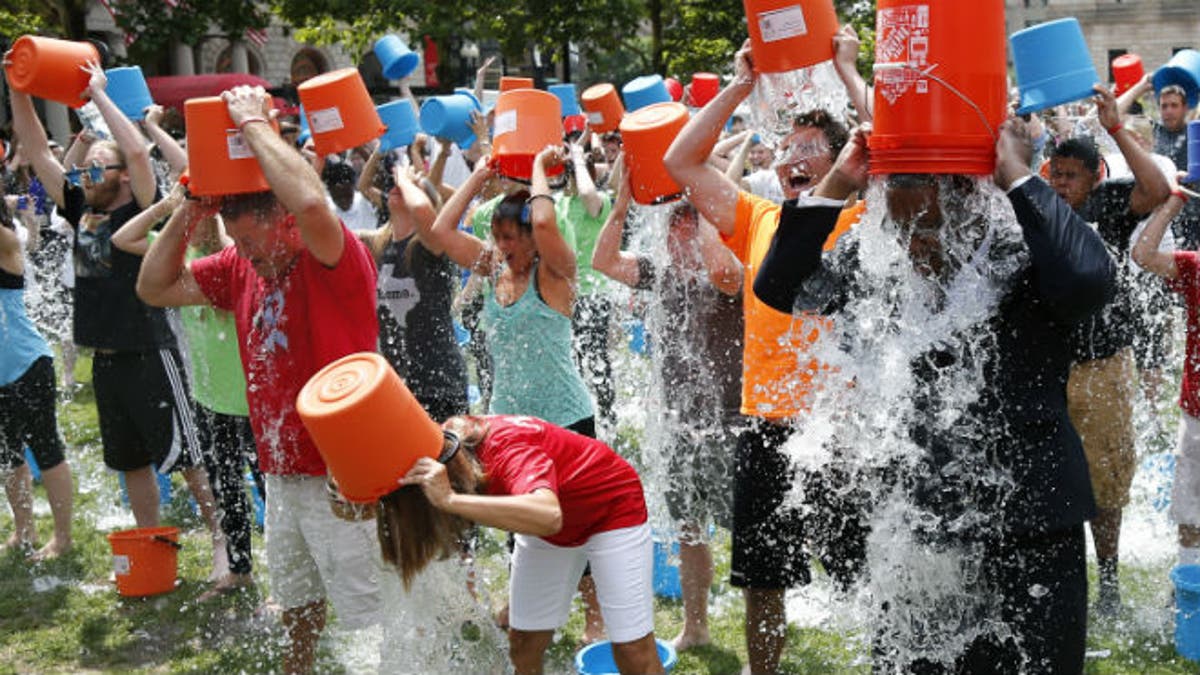
Boston City Councillor Tito Jackson, right, leads some 200 people in the ice bucket challenge at Boston's Copley Square, Thursday, Aug. 7, 2014 to raise funds and awareness for ALS. (AP Photo/Elise Amendola)
The idea is simple: Take a bucket of ice water, dump it over your head, record it and post the video on social media.
It's cold, it's fun and it's contagious. But these ice bucket challenges and similar social media-powered stunts also are raising awareness and money for causes such as Lou Gehrig's disease, breast cancer and a camp for kids who have lost their fathers to war.
Martha Stewart has been doused. So has Matt Lauer. And pro golfer Greg Norman.
The fundraising phenomenon asks those willing to douse themselves to challenge others to do the same within 24 hours. If they don't, they must make a donation to a certain charity. Each person who participates nominates more friends, who nominate more friends, who nominate still more friends, which explains why the trend has exploded.
The months-old movement has taken the Boston area by storm over the last 10 days, since friends and relatives of former Boston College baseball player Pete Frates used it to raise awareness about Lou Gehrig's disease. Frates was diagnosed with the neurodegenerative disease, also known as ALS, in 2012. Frates, 29, is now paralyzed, eats through a feeding tube and cannot talk.
On Thursday, his parents, Nancy and John Frates, joined 200 people who doused themselves in Copley Square. The couple said the ice bucket challenge has done more to increase understanding about ALS than anything they've done over the past two years.
"Who knew all it would take was a bag of ice and a bucket?" John Frates told the crowd, just before participants simultaneously poured 9-quart buckets of ice water over their heads.
While most were wearing T-shirts or other casual summer attire, City Councilor Tito Jackson stood out in a suit and tie, which promptly got soaked.
"This is a little bit of discomfort for a second, but it's a lifetime of challenges for people with ALS," Jackson said.
Similar challenges have attracted athletes, politicians, doctors, accountants and construction workers. They can take all sorts of forms: There are no-makeup selfies to raise money for cancer causes and cold-water plunges for kids' camps.
Lauer got soaked with ice water last month after Norman challenged him and ended up kicking in some cash for the Hospice of Palm Beach County, in Florida.
Operation 300 is a foundation in Stewart, Florida, that hosts a camp for kids who lost their fathers to war. Founded by the family of Navy SEAL Aaron Vaughn, who was killed in a helicopter crash three years ago, the foundation gets support from local firefighters, one of whom decided to put his money where his mouth was: Pay $50 and avoid the icy dousing or get wet and pay $20.
"He just happened to call out five other local firemen," said Tara Baldwin, Vaughn's sister. "When one of them called the others out, they all sort of naturally said they wanted to get involved."
Since the spring, the foundation has raised about $15,000 from the ice water challenge.
There can be dangers. Authorities in Camden Township, Minnesota, said 16-year-old Davis Colley drowned in May when he jumped in a lake as part of a challenge, and in some states, police warned parents and kids to avoid jumping into frigid or fast-moving waters.
For those who work to raise awareness of ALS, the ice bucket challenge has been a windfall.
The ALS Association's national president, Barbara Newhouse, said donations to the national office surged during the 10-day period that ended Thursday, to about $160,000, from $14,480 during the same period a year ago. That's not counting donations to chapter offices around the country, Newhouse said.
"It's just been wonderful visibility for the ALS community," Newhouse said. "It is absolutely awesome. It's crazy, but it's awesome, and it's working."







































